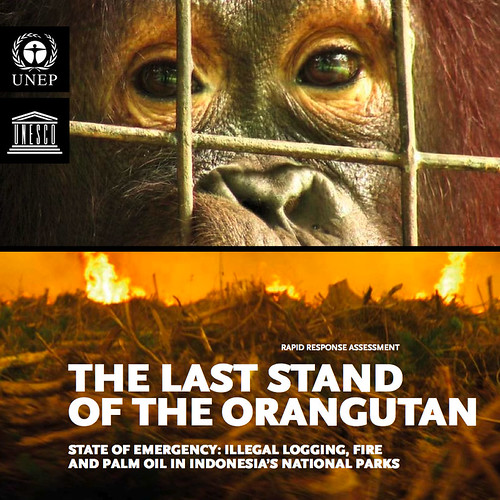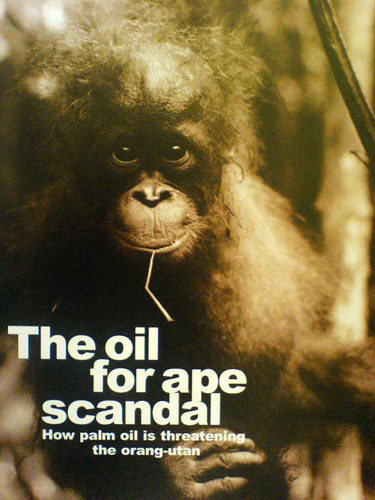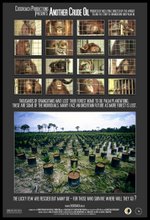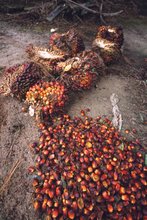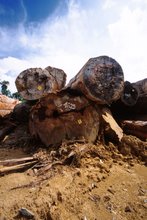Wednesday 27 February 2008
Penusah Tana, The Forgotten Struggle, a film by Hilary Chiew and Chi Too
a film Hilary Chiew and Chi Too
Penusah Tana - the forgotten struggle
For over 20 years, Ajang Kiew, a Penan Leader, has been setting up blockades to protect his Native Customary Rights land from the intrusion of logging companies. To his dismay, his cries and efforts have fallen on deaf ears. Now, he sets up one final struggle before oil palm and tree plantations take over for good.
Tuesday 22 January 2008
Photos from the Palm Oil Story
Friday 8 June 2007
Tuesday 22 May 2007
WHY IS UNSUSTAINABLE PALM OIL EXPANSION A MAJOR ENVIRONMENTAL PROBLEM?
World-leading orangutan experts have now identified the clearance of rainforest for palm oil expansion as the single greatest threat to the survival of the orangutan in the wild. Current estimates are that each year 5,000 orangutans are dying in Borneo, and 1,000 a year in Sumatra – that means 15 orangutans are dying every single day. This is catatrophic for the orangutan, but also reflects the loss of a wider rich and unique biodiversity within the Indonesian rainforest. For example, Sumatran lowland forest is 2.5 times richer in terms of biodiversity of species than the very best Amazonian rainforest, and 1.8 times richer than the best Central African rainforest. This means that unsustainable palm oil production is destroying the most species-rich rainforests in the world. Orangutans, Asian elephants, sun bears, clouded leopards, Sumatran tigers, hornbills – these are just some of the better-known species losing their habitat and their lives due to unsustainable palm oil expansion.
Forest conversion for palm oil almost always impacts negatively on local people who are often reliant on natural forest for their livelihood. Whilst an estimated 2% of the Indonesian population make their living from the palm oil industry, almost 44% are reliant on natural forest resources. In Kalimantan, jobs on the plantations often go to migrant labourers from elsewhere in Indonesia, leaving a disenfranchised and dispossessed local population. On occasions when local people were employed by the plantation we discovered the household income for the family was still often reduced by up to 50%. In Indonesia, pollution from chemical spraying at plantations, and unprocessed effluent from mills from less scrupulous companies is getting into local water supplies – causing illness, particularly in children, and killing off fish stock, that in some areas was the focus of the local economy.
On a global scale, Indonesian deforestation for palm oil is also inextricable from climate change. There are widespread environmental and economical threats, not to mention human health risks, posed by the ever-growing problem of smog and smoke stretching as far as Kuala Lumpur caused by huge forest fires during the dry season each year. Furthermore, the topside clearance of peat-swamp forests is one of the most worrying environmental threats of our time. The subsequent release of CO2 and methane from peat reserves in Kalimantan and Sumatra (which in some places reach 60 metres in depth) is already impacting upon greenhouse gas levels and global climate change.
The devastating forest fires of 1997 made up 30% of global CO2 emissions that year. This was the greatest single anthropogenic release of greenhouse gases on record. The palm oil crisis is evidently a matter of critical importance, not only for Asian conservation, but globally. Perversely, the proposed development of palm oil for biofuel – initially provoked by the desire for a sustainable alternative to fossil fuels – will amplify the current problem unimaginably.
Sunday 11 February 2007
WHAT IS PALM OIL?
During the last 15 years, annual global production of palm oil has trebled. By 2004, Europe was the world’s largest importer of palm oil, making up 17% of the market. In the UK, palm oil is present in 1 in 10 supermarket products – from lipstick to margarine, cereals to soap. It is almost always labelled generically as a “vegetable oil”.
Oil palms produce a greater yield per hectare than any other edible oil (up to ten times that of soya) and palm oil is valued by producers because it is solid at room temperature. Although the plant itself originates from West Africa, the vast majority of palm oil comes from Malaysia and Indonesia, where monoculture plantations are rapidly replacing some of the most bio-diverse areas of rainforest on Earth. After planting, it takes 3-4 years for the palms to become productive, and they have a life expectancy of around 25 years.
Palm oil production is predicted to increase by another 30% by 2010. Demand is increasing from the growing economies of China and India, and the development of palm oil for biofuel could see the crisis skyrocket.
PALM OIL: DEVELOPING A CONSTRUCTIVE SOLUTION...
The Roundtable on Sustainable Palm Oil (RSPO) is an alliance of palm oil producers, processors, traders, consumer goods manufacturers, retailers and non-governmental organisations (NGOs) established in order to develop the principles and criteria of sustainable palm oil, and facilitate the development of sustainable palm oil production. The Orangutan Film Protection Project is part of the broader Ape Alliance Palm Oil Working Group (ApAl POWG) which has worked to push for responsibility from the UK retail sector and to support the goals and objectives of the RSPO. As a result of our work and the work of the ApAl POWG partners we have seen a huge shift in the UK retail sector with all major supermarkets now belonging to the RSPO. This is a great step forward, and is illustrative of the positive benefits of the collaborative approach of the RSPO, where industry representatives and environmental and social NGOs all get a voice.
We need your help to continue to make a difference: see Current Campaigns
Products Containing Palm Oil
Often ‘vegetable oil’ is written on a product’s ingredient list, the consumer then does not know if they are eating sunflower seed oil, rape oil or palm oil – as such, palm oil it is often a hidden ingredient.
1 in 10 UK supermarket products contain palm oil
Current Campaign Action Points
1) Postcard Campaign
Postcards to MP and MEPs
You can now order campaign postcards (for volunteer distribution), from Helen at Sumatran Orangutan Society. They are jointly endorsed by eight organizations including Cockroach Productions OFPP, Ape Alliance, Sumatran Orangutan Society, Orangutan Foundation, Borneo Orangutan Survival Foundation, Born Free, EnoughsEnough and Biofuelwatch. There are postcards for both UK MPs and also postcards for MEPs - it would be great if you could do both, furthermore we ask that you get your friends and family to do so also. If you'd like to distribute these cards more widely, just let us know.
For more details please email: nick@cockroach.org.uk
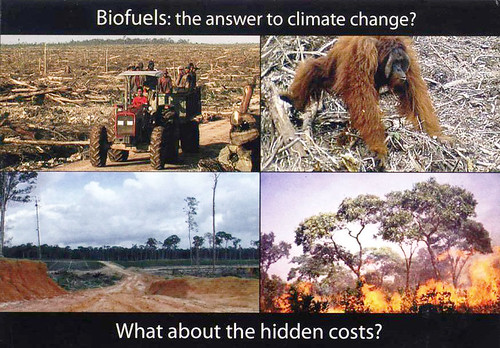
2) BioFuelWatch Open Letter
“OPEN LETTER: WE CALL ON THE EU TO ABANDON TARGETS FOR BIOFUEL USE IN EUROPE”
A letter from over 150 organisations and key individuals to the EU Council. Signatures are still being collected. If you or your organisation would like to sign, please contact us at info [AT] biofuelwatch.org.uk
Download the .pdf
Read the Signatories
Cockroach Productions runs a number of non-profit education initiatives to protect existing natural forest in Indonesia and to protect endangered species such as the orangutan and Sumatran tiger. The Orangutan Film Protection Project and Films4Conservation are two aspects of this work. We have been awarded a Special Commendation from the British Environment and Media Awards and were finalists in the WildScreen/FFC Conservation Filmmaker of the Year Awards 2006, but we need your support to continue our work.
For information on how to donate please contact Evie Wright: evie@cockroach.org.uk
4) Donate Old or Unused Equipment
Have you got any old laptops, digital cameras or GPS devices that you haven't used in a while? Would you like to see them put to good use? We can help you find good homes for this sort of equipment. As Cockroach Productions expands its reach into environmental and social documentary we will help support the local communities we work with. One way of doing this is to provide local people with the tools that will allow them to communicate the issues they are facing on the ground. Digital cameras and camcorders provide a wonderful and immediate means of documenting what is happening in at local levels and reporting it to the wider world. If you provide the kit we will make sure it finds a good new home and that the people using it will be trained in operating it. Please drop us a line if you think you have something that might be useful.
Contact nick@cockroach.org.uk / 07850 921 208
Friday 22 September 2006
Orangutans and Palm Oil - SKY World News Tonight
SKY World News Tonight explore the impact of unsustainable palm oil on the remaining orangutan populations in Borneo and Sumatra. James Rubin presents with Lisa Holland.
Thursday 21 September 2006
Orangutans and the Bio-Fuel Boom!
Remember if farmed properly oil palm plantations will give a net benefit to climate, especially if they are grown in degraded land that is now covered in grass and is subject to the annual burn cycle in Kalimantan.
